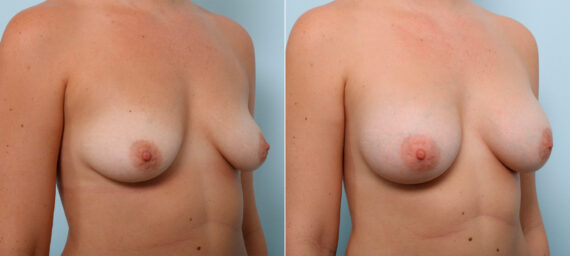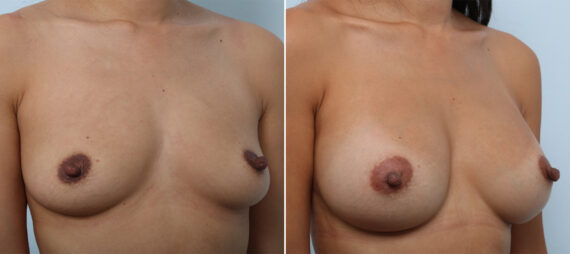Women who are thinking about getting breast implants often wonder if having them will impact their ability to breastfeed later on. It’s essential to be aware of how breast implants could affect nursing, which helps with making well-informed decisions. Top plastic surgeon in Houston, Dr. Paul Vitenas, shares his expertise on the subject, explaining how various implant types may affect the breastfeeding experience.
This overview provides information on the optimal timing for breast augmentation with respect to future pregnancies, the risks involved, and the essential questions to raise with your surgeon to understand what to expect. Dr. Vitenas also highlights various options and resources available to support women who choose to breastfeed after receiving breast implants.

Breast Implants and Breastfeeding Insights
- Women with breast implants can often breastfeed, but it depends on the type of surgery they had.
- The placement of implants and the incision location can impact milk production and breastfeeding ability.
- Breastfeeding with implants may require additional support and monitoring to ensure the baby receives enough milk.
- Planning your breast implant surgery after you are finished having children can minimize potential breastfeeding issues.
- Consulting with a breastfeeding specialist and a surgeon before getting implants can help address concerns about future breastfeeding.
The Impact of Breast Implants on Breastfeeding
The placement and type of breast implants can significantly affect breastfeeding, primarily focusing on milk supply and how well the milk ducts work. When implants are placed under the glandular breast tissue or muscle, it’s less likely they’ll interfere with nipples and the complex network of milk ducts each nipple contains. However, the health of glandular tissue, essential for milk production, might be at risk depending on the surgical approach.
Breast implants, particularly silicone breast implants, could hinder milk production if they impact the glandular tissue or nerves that play a critical role in nipple stimulation, which is crucial for encouraging breast milk flow. Adequate nipple stimulation and healthy milk ducts are vital for signaling the body to produce breast milk.
In situations where breast tissue has significantly changed or if implants obstruct the natural flow of milk, mothers may face challenges with milk production for nursing their babies. This emphasizes the need to consider the impact on milk production when planning for breast implants and highlights the importance of functional breast tissue for successful breastfeeding.
Exploring the Types of Breast Implants and Their Effects on Breastfeeding
When pondering breast implants, the selection of type and placement location play vital roles in breastfeeding outcomes. The choice between silicone breast implants and saline implants significantly influences the future possibility of nursing. Additionally, deciding on the placement of breast implants—either beneath or atop the breast muscle—is crucial for nursing endeavors.
Concerns often arise among women with breast implants regarding the potential alterations in breast appearance and function during breastfeeding. Mothers with silicone breast implants notably question the safety and production of their milk. However, the design of the breast augmentation procedure aims to preserve milk production abilities, focusing on avoiding nerve damage and maintaining nipple sensitivity.
Key decisions during the breast augmentation surgery have a direct impact on a woman’s ability to breastfeed. Although there are common worries about the type of implants used, their location, and the possibility of successfully breastfeeding, numerous cases show that women with breast implants manage to breastfeed efficiently, particularly when the procedure spares the milk ducts and nerves from damage. Importantly, a well-performed breast surgery doesn’t automatically preclude breastfeeding options. Individuals contemplating breast augmentation are encouraged to engage in thorough discussions with their surgeon, aiming for optimal post-surgery breastfeeding results.
Deciding when to get breast implants before planning a pregnancy involves crucial timing considerations to minimize the potential impact on breastfeeding post-surgery. It’s advisable to opt for the breast augmentation procedure when there is no immediate plan to become pregnant, allowing ample time from placement for the body to heal properly.
For those who are mothers or considering motherhood, discussing timing considerations with a surgeon is essential, and exploring contouring solutions for your post-baby body that may complement your breast surgery can enhance your overall results. This ensures the possibility of breastfeeding after breast augmentation remains viable. Being informed about how the procedure could influence future pregnancies empowers expectant mothers to make knowledgeable decisions.
Do Breast Implants Affect Breastfeeding – Potential Complications and Considerations
Breast implants can make breastfeeding a bit more challenging for both the mother and the baby. Some common issues include changes in nipple sensitivity. This might affect how breastfeeding feels. For instance, some women notice a decrease in nipple sensation, which can make breastfeeding harder. On the other hand, an increase in sore nipples is more common among women with implants compared to those without.
With breast surgeries like breast reduction, breast lift, or breast augmentation surgery, there is a chance they could interfere with the supply of milk. There’s also an increased risk of mastitis, especially if the surgery damages milk ducts or nerves. This damage could lead to insufficient milk production. Sometimes, using a breast pump might be necessary to help keep up the supply of milk.
Another concern is that changes in breast size after surgery might affect milk supply or how well the baby can latch. This consideration is essential for anyone thinking about getting breast reduction breast augmentation or any breast surgery and plans to breastfeed.
Additionally, consulting an obstetrician is vital to understand the specific risk. This professional advice is crucial, especially for those considering breast reduction or any procedure that could impact breastfeeding. They can provide insight into precautions to mitigate the risk of mastitis and manage sore nipples, ensuring both mother and child are comfortable and healthy.
Breastfeeding After Implants: Alternatives and Additional Support

Women with breast implants may have some concerns about breastfeeding. It’s a good idea to consult with a lactation consultant who can provide tailored advice and support for your situation. For those finding it challenging to maintain a steady breast milk supply, there are safe options to ensure your baby continues receiving the necessary nutrition:
- Donor breast milk: A safe option for those who are unable to produce enough milk.
- Pasteurized breast milk: Ensures the baby receives all the benefits of breast milk in a safe manner.
- Baby formula: Serves as a nutritious substitute offering a practical alternative when breast milk isn’t an option.
Consulting a breastfeeding medicine specialist can provide beneficial insights, especially for issues related to lactation after a breast reduction. To potentially aid in increasing your milk production:
- Consider using Lactation Supplements.
- Participate in a prenatal lactation program to prepare for breastfeeding challenges.
Assistance from baby nurses might make the journey smoother for both the breastfeeding baby and the mother, ensuring a breastfed baby receives the necessary care and nutrition, regardless of the method.
Questions to Ask Your Surgeon: Making an Informed Decision
When thinking about getting breast implants, it’s important to have a good discussion with your breast surgeon. To make sure your breast augmentation consultation is helpful and to feel positive about your breast experience, here are key questions you should consider:
- Concerns about breast augmentation: How might breast surgery affect my ability to breastfeed in the future?
- Breast implant placement: How does placing silicone breast implants impact the glands and major nerves that are important for milk production and the feeling in my entire breasts?
- Experiences of women with breast augmentation: Could you share stories of women with breast augmentation who have successfully breastfed?
- Qualifications of the Surgeon: Is the plastic surgeon board-certified in plastic & reconstructive surgery? Asking this confirms you are seeing a board-certified plastic surgeon who is experienced in popular plastic surgery procedures, including breast lift surgery.
Talking about these issues with a plastic surgeon will help address your concerns and make sure you are well-informed about plastic surgery and how it might affect breastfeeding.
If you’re thinking about getting breast implants and are worried about how they might impact breastfeeding, it’s wise to get advice from professionals. We suggest you book a meeting with Dr. Paul Vitenas. He has more than 30 years of experience in cosmetic surgery.
You’ll find him at Vitenas Cosmetic Surgery in Houston, TX, where he uses his broad knowledge and skills to guide you through your choices and ensure they fit your needs. It’s crucial to have the right support for such a significant decision, so please schedule a consultation.


